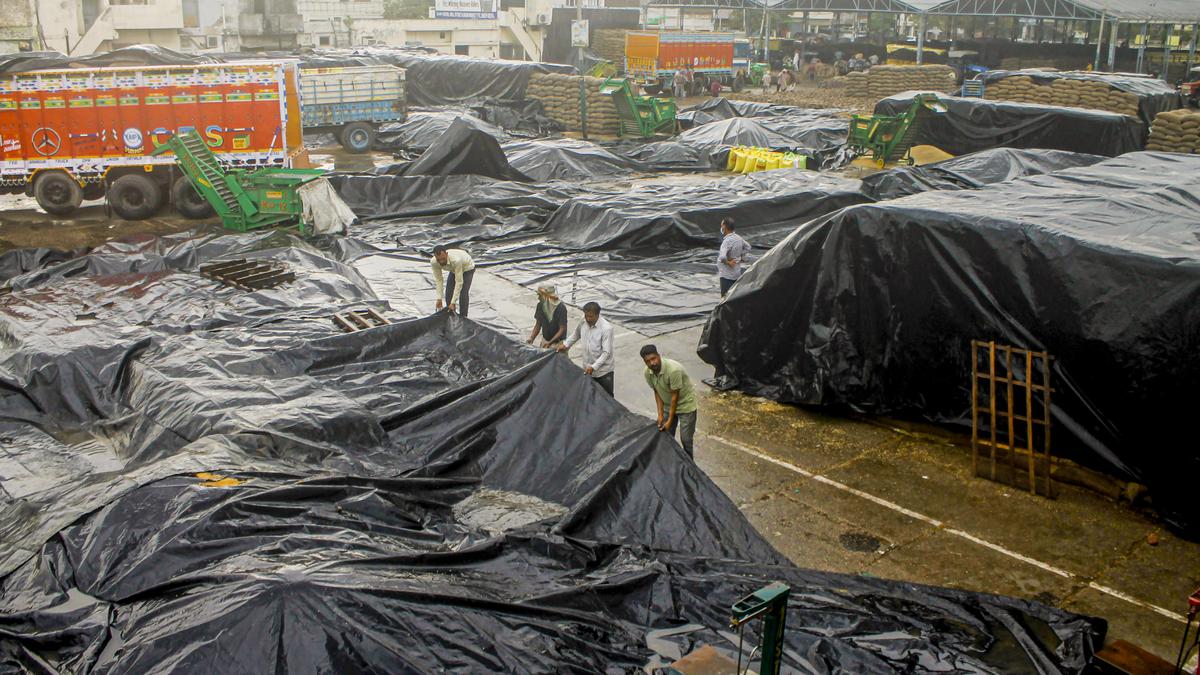To enjoy additional benefits
CONNECT WITH US
June 04, 2023 01:03 pm | Updated 01:28 pm IST – New Delhi
COMMents
SHARE
READ LATER
Rains caused by western disturbance coming at a vulnerable ripening stage of wheat crop severely affects the quality of the grain near Sirhind Road, in Patiala, Wednesday, April 19, 2023. Soon, television screens will flash warning messages about the impending extreme weather events in the country. | Photo Credit: PTI
Soon, television screens will flash warning messages about the impending extreme weather events in the country and songs on radio will be cut short to make way for the urgent alerts.
The National Disaster Management Authority (NDMA) has recently started sending text messages on mobile phones to disseminate critical information about heavy rainfall, thunderstorms and heat wave, among others.
It now plans to expand the warning system to television, radio and other mediums to ensure citizens are promptly informed and better prepared for severe weather, according to officials.
Also Read | KSDMA issues weather warnings on SMS to people in Karnataka
"The text-based system is part of phase one of the project. TV, radio and other mediums are being covered in phase two which will be implemented by the end of the year," a senior NDMA official told PTI.
With the amalgamation of technology and communication, the NDMA aims to surpass the limitations of text-based warnings, he said.
Before text messages, the NDMA used to issue such early warnings through the 'National Disaster Alert Portal' and a mobile application called "Sachet".
The agency had conceived the "Common Alerting Protocol Based Integrated Alert System" to bring together the alert generating agencies, including the India Meteorological Department, Central Water Commission, Indian National Centre for Ocean Information Services and Forest Survey of India, alert disseminating agencies and state disaster management authorities on a common platform.
Also Read |C-DOT developing tech to tap all media for broadcasting disaster alerts
The Centre sanctioned the pan-India implementation of the first phase of the project in 2021 following a successful pilot project in Tamil Nadu.
"This is the largest early warning programme in the world called 'common alerting protocol'. People don't need to subscribe to WhatsApp, email or SMS groups. You will get the alert automatically," another NDMA official said.
The messages will be broadcast in two languages, including the local language, alerting people about the impending severe weather event. Going ahead, mobile phones will vibrate upon receiving such alerts, he said.
"If you're watching television, the TV screen will flash the warning message and there will be audio too. If you're listening to a song on the radio, it will be cut short and the alert will be aired. This will be done very shortly," the official said.
He said India will be the only country outside the global north to have a common alerting protocol.
Also Read | India tells UN it is developing programmes to reduce risk of losses from all hazards
According to IMD, India lost 2,770 people to extreme weather events in 2022. Of them, 1,580 died reportedly due to lightning and thunderstorms, while 1,050 died due to floods and heavy rains. The remaining deaths were due to heat waves, hailstorms and dust storms.
Natural disasters, heavy floods and cyclones, triggered around 2.5 million internal displacements in India in 2022, according to a report by the Geneva-based Internal Displacement Monitoring Centre.
Extreme weather, climate and water-related events caused 573 disasters in India between 1970 and 2021 that claimed 1,38,377 lives, according to data from the World Meteorological Department.
COMMents
SHARE
weather / weather news
BACK TO TOP
Comments have to be in English, and in full sentences. They cannot be abusive or personal. Please abide by our community guidelines for posting your comments.
We have migrated to a new commenting platform. If you are already a registered user of The Hindu and logged in, you may continue to engage with our articles. If you do not have an account please register and login to post comments. Users can access their older comments by logging into their accounts on Vuukle.
After text messages on phone, extreme weather alerts on TV, radio soon – The Hindu


